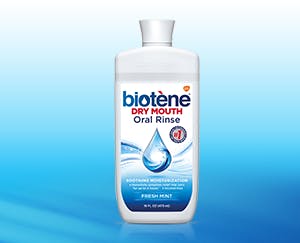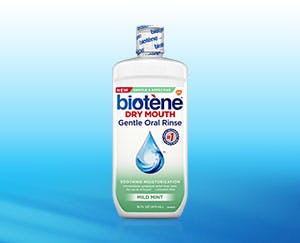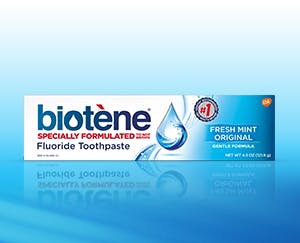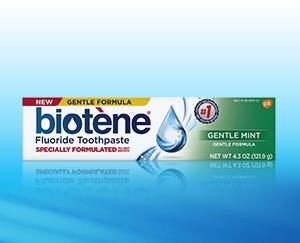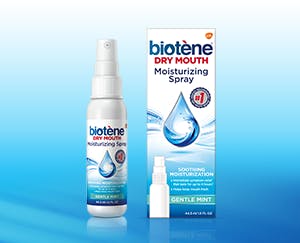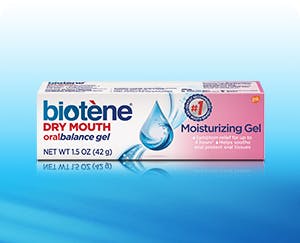
Dry mouth, also known as xerostomia, is a common condition characterized by a lack of saliva.1 If left untreated, dry mouth can cause discomfort, difficulty speaking and an increased risk of dental problems.2 Various lifestyle factors can exacerbate dry mouth, including smoking and excessive drinking. Explore the relationship between smoking, alcohol and dry mouth, and learn how to cut back on substances for your overall health.
What Is Dry Mouth?
Dry mouth occurs when the salivary glands in your mouth don’t produce enough saliva to keep your mouth moist.1 This leads to other symptoms including a dry, sticky sensation in the mouth and throat, cracked lips and mouth sores.3 Saliva plays an important role in your oral health: it lubricates your mouth, helps you swallow and neutralizes acids and bacteria to help prevent tooth decay.1 Without adequate saliva, your oral health is at risk and it’s harder to taste and enjoy food.1
Dry mouth may be a symptom of a larger underlying condition that needs to be addressed by your healthcare provider.1 However, some patients can improve their dry mouth with small lifestyle changes. If you indulge in tobacco products and alcohol, even recreationally, it may be making your dry mouth worse.1
Smoking and Dry Mouth
Smoking or chewing tobacco can increase symptoms of dry mouth.1 Studies have found an association between long-term smoking and a reduced salivary flow rate, meaning that smokers are less likely to have normal amounts of saliva.4 This is because the harmful effects of cigarette smoke can irritate and damage the salivary glands.4 The substances found in cigarettes also destroy the protective enzymes and proteins found in saliva, which can cause more severe oral health problems.4
Additionally, smoking can impact the quality of saliva by reducing the secretion of watery saliva.4 The parotid glands, which make saliva watery, are the first part of the salivary glands that are affected by smoking.4 Smokers tend to have thick, sticky saliva, which is a symptom of dry mouth.1,4
Alcoholic Beverages and Dry Mouth
Drinking alcoholic beverages leads to an excessive loss of fluids, which can cause mild dehydration.5 Dehydration is also symptom of dry mouth.2 When you are dehydrated, your body does not have enough fluids to produce saliva.6 If you already have dry mouth, alcohol consumption or even alcohol-based mouthwashes can exacerbate your dry mouth symptoms.6
Avoid Dry Mouth Triggers
Avoiding dry mouth triggers like smoking and alcohol can help you treat your dry mouth symptoms.2 Saliva works to protect your mouth and teeth, so it’s important to stay away from things that can dry your mouth out and cause dry mouth symptoms.2 Seek professional support, such as counseling or smoking cessation programs, if you need help overcoming these habits.6
How to Relieve Dry Mouth
Managing your dry mouth at home can help you alleviate your discomfort. In addition to limiting your substance use, try these additional at-home tips to relieve dry mouth.
- Stay hydrated. Maintaining your hydration levels is one of the easiest ways to combat dry mouth. Drink plenty of water throughout the day and always keep a water bottle near you. Sipping water regularly can help moisten the mouth and alleviate dryness.6
- Try sugar-free gum or candy. Chewing sugar-free gum or sucking on sugar-free candies can stimulate saliva production and provide temporary relief from dry mouth.2
- Maintain oral hygiene. Proper oral hygiene practices as directed by your dental professional, including regular brushing with a fluoride toothpaste and flossing, can help prevent oral health issues associated with dry mouth.6
- Moisturize the air. Using a humidifier in your bedroom or living space can add moisture to the air and help to relieve dryness in the mouth and throat.2
- Avoid dehydrating food and drinks. In addition to alcohol, caffeine and carbonated drinks like soda can also contribute to dry mouth. In general, it’s best to avoid any overly acidic, spicy, salty, dry or sugary foods and beverages if you struggle with dry mouth.2
- Use products that are designed to moisturize. Try a specialized rinse or gel that’s formulated to help relieve dry mouth symptoms, like Biotène.
Now that you understand the link between dry mouth, smoking and drinking, you’re ready to make the necessary lifestyle changes to ease your dry mouth. If you’re looking for additional dry mouth tips, explore more articles on our Living with Dry Mouth hub.
Source Citations:
- Dry mouth - Symptoms and causes - Mayo Clinic. https://www.mayoclinic.org/diseases-conditions/dry-mouth/symptoms-causes/syc-20356048. Accessed 6/13/23.
- Dry Mouth: Xerostomia: Causes and Treatment. Cleveland Clinic. https://my.clevelandclinic.org/health/diseases/10902-dry-mouth-xerostomia. Accessed 6/13/23.
- Dry Mouth. MedlinePlus. https://medlineplus.gov/drymouth.html. Accessed 9/20/2023.
- The Effect of Tobacco Smoking on Salivation. National Library of Medicine. https://www.ncbi.nlm.nih.gov/pmc/articles/PMC4945334/pdf/ASC_49(4)_309-315.pdf.Accessed 11/13/2023.
- Hangovers. National Institute on Alcohol Abuse and Alcoholism. https://www.niaaa.nih.gov/publications/brochures-and-fact-sheets/hangovers. Accessed 9/20/2023.
- Dry mouth - Illnesses & conditions | NHS inform. https://www.nhsinform.scot/illnesses-and-conditions/mouth/dry-mouth. Accessed 6/13/23.


